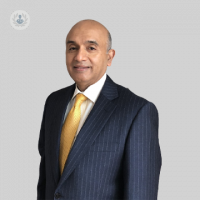How long does it take to recover from a total knee replacement?
Written by:In our latest article, highly revered consultant trauma and orthopaedic surgeon, Mr Dipen Menon, walks us through in expert detail how long patients usually require to recover from a total knee replacement, and outlines the main potential risks associated with the operation.

What are the main alternatives to a total knee replacement surgical procedure?
The main total knee replacement operative alternatives that can be helpful in the arthritic knee are:
- Arthroscopic (keyhole) surgery
- Osteotomy
- Partial or half knee replacement
How long does a patient need to recover from a knee replacement operation?
Following a total knee replacement, the physiotherapy team try and get the patient up and about the same day, depending on the extent of recovery from the anaesthetic. The patient is encouraged to put full weight on the operated leg and will need to use crutches for roughly four to six weeks after the operation.
The aim is to try and discharge patients after one or two nights in hospital. It takes about four to six weeks for most of the pain from the operation to settle down. It is important for patients to exercise their operated knee and leg as much as possible.
It is (maybe) possible for patients to commence driving after six to eight weeks have passed. In those patients who perform sedentary jobs, it may be possible to return to work at this stage in their recovery. Almost all of the operative pain will have settled, and a good range of movement can be achieved by about three months after surgery.
It will be possible for those who perform heavy manual jobs to return to work by about 10 to 12 weeks after their operation. A continued but slower recovery takes place for about 18 months to two years from surgery. It is important to persevere with knee exercises for at least 18 months after any knee replacement surgical operation.
What are the main potential risks and complications following knee replacement surgery?
Knee replacement is an effective operation when it comes to relieving knee pain as well as improving the quality of life in patients who suffer from intrusive knee symptoms. The knee pain is completely relieved in most patients who undergo replacement surgery.
The pain may not be entirely relieved in a small group of patients, although various patient-reported outcome measures (PROMs) suggest that the intensity of pain is reduced for most patients following a knee replacement. A very small number of patients report a chronic worsening in their knee pain following surgery.
Roughly two in every 10 patients may not be entirely satisfied with their final outcome due to various reasons, such as a less-than-anticipated reduction in the intensity of their pain, a less-than -anticipated improvement in their quality of life or when they have complications following surgery.
Patients who undergo a knee replacement may find it difficult to kneel after surgery, and this can have implications for those who need to kneel at work (e.g. plumbing). Most patients do not achieve a full range of movement in their operated knee (i.e. the range of movement that they have in their unaffected knee, or the range of movement that they had in their knee when they were young adults).
About two in every 100 patients who have a knee replacement will, unfortunately, suffer from a deep infection which will need further surgery, which may ultimately culminate in the need for revision surgery. Antibiotics are administered both before and after the operation to reduce this risk.
Deep infection can also occur with a greater frequency in patients who have poor immunity to infection and in those who are taking immuno-suppressive medicines. Poorly controlled diabetes mellitus can also predispose to deep infection.
Patients can develop deep vein thrombosis (blood clot) in the leg which can cause long-term problems in the leg related to the clot. In some patients, the clot may migrate into the lung and this can be a life-threatening condition that needs to be managed urgently. Patients are administered anticoagulants (blood thinners) immediately following their operation, continuing this for about 14 days to reduce this risk.
However, taking blood thinners can unfortunately cause bleeding into the joint and oozing of blood or serous fluid from the surgical incision, that can delay wound healing and predispose to deep infection.
All patients who undergo knee replacement will note a patch of numbness that may be permanent, on the outer aspect of their knee, extending sometimes into their leg. This results from damage to small nerves under the skin that carry the sensation from these areas.
Patients’ knee can stiffen following surgery and, thus, it is important to start exercising the knee to improve the range of movement in the knee as soon as possible. Injuries to surrounding structures like major nerves and blood vessels are fortunately very rare, but can nonetheless result in life-altering outcomes.
A major nerve injury can result in paralysis of the muscles in the leg and foot and a permanent loss of sensation. A major blood vessel injury will need further surgery as an emergency and there is a small risk of losing the leg (amputation).
It is possible to break (fracture) the bone around a knee replacement following a fall or when the prosthesis becomes loose. This can also occur more rarely at the time of the initial surgery. The fracture will need usually surgical treatment (treatment with a plate, a nail or sometimes a combination of both these implants) to facilitate fracture healing in an optimal position.
If you are considering undergoing a surgical operation in order to improve the overall functionality of your knee, you can book an appointment with Mr Dipen Menon today via his Top Doctors profile.


